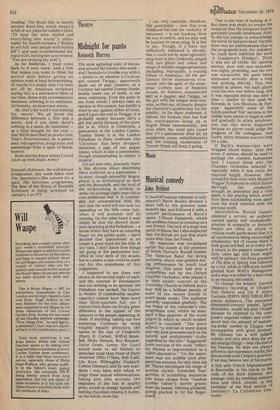Music
Musical comedy
John Bridcut
Is musical humour inherent or only esoteric? Pierre Boulez devoted a short talk to this question some months ago, and followed it with a concert performance of Ravel's opera, L'Heure Espagnole, which the audience found as amusing as a wet flannel. The lack of a stage was partly to blame, but I also suspected that the British are just that much more dour than the French.
My suspicion was invalidated earlier this month at the premiere of Simon Thome's 'Round Games: The Gamelan Band' for string orchestra, which was greeted durirlg performance by much loud laughter. This piece had won a competition run by the Oxford Chamber Orchestra, who played it in their termly concert at the University Church in Oxford, and it may well be a brilliant ,parody of some of the recent trends in avant-garde music. The audience certainly responded gleefully. The fun began in the composer's own programme note, where he managed a fine pastiche of the worst jargon in which so much modern music is couched: "The piece reflects nw interest in static states and very slow processes such as the natural and evolutionary' cycles suggested by the title." Suggested? Some sections of the work "reflect my interest in improvisation as a viable alternative." Yet the merriment was not audible until after about ten minutes, for only then did Mr Thorne encompass his range of musical clichés. Extended 'free', sections of scrambling sequences (the notes chosen from "random number tables"), earthy grunts from the basses, whining glissandi, strings plucked to hit the fingerboard.. , . That is one way of looking at it. But there was much to arouse the suspicion that the composer had no genuinely parodic intentions. First, he did not emerge to acknowledge the mirth he had provoked. Second, there was no unmistakable clue in the programme note (for instance, he could have subtitled the work 'A Conductor's Holiday'). Third, it was not all cliche: the opening section, slow and near-immobile, was highly promising, and the end was resourceful, the parts being eliminated severally after a long and striking melody. This was started in unison, but each player went his own way before long, and it was repeated minus one note a time — similar to that used by Rzewski in 'Les Moutons de Panurge.' Apparently some of the hotch-potched 'free' sections in the middle were meant to begin at odds and gradually to attain synchronism, but this never happened because no player could judge the progress of his colleagues. And fourth, thirty minutes was too long for a joke.
If Bach's manuscripts were , wrapped round butter, then this score, if serious, should be used to package the coarsest Indonesian lard. I cannot think why the Chamber Orchestra selected it, especially when it was twice the required length. However, they atoned for their error with Mozart's 'Prague' Symphony in which Simon McVeigh, the brought an assurance a.
spark to the playing which would conductor, d a u vital 1 have been outstanding even apart from the stark contrast with the previous work. Nevertheless 'Round Games' rendered a service: an audience reacted openly and unabashedly, whether in sympathy or derision. People are often so afraid to criticise avant-garde music that it is all swallowed as being unvaryingly wholesome; but of course there is both good and bad, as in every era. A return to the peppery tempers of forty years ago and more might well be salutary: the Paris premiere of The Rite of Spring was followed by a riot, while in 1930 stink-bombs greeted Kurt Weill's Mahagonny and a man was killed by a beer-mug in an ensuing discussion,. To change the subject: Garrick Ohlsson's recording of Chopin 's four Scherzi and the F minor Fantasia (HMV): HQS 1328 £1.50) is almost definitive. The renowned nineteenth-century pianist, Ignaz Moscheles, would not play Chopin because he objected to the composer's required rubato and considered that the amount of sustaining-pedal needed in Chopin was incompatible with good pianism. Mr Ohlsson has a well judged rubato, and only once does the Pedal smudge things — near the end of the Fantasia. He does not always adhere to the expression marks, but this accords with Chopin's practice, if we may believe one of his pupils. A link with French Impressionism is discernible in the run-in to the coda of the third Scherzo: this passage, with its rumbling ostintahtoe bass and thick chords, is exemplar of the final section of Debussy's `La Cath edrale En gloutie.'














































 Previous page
Previous page